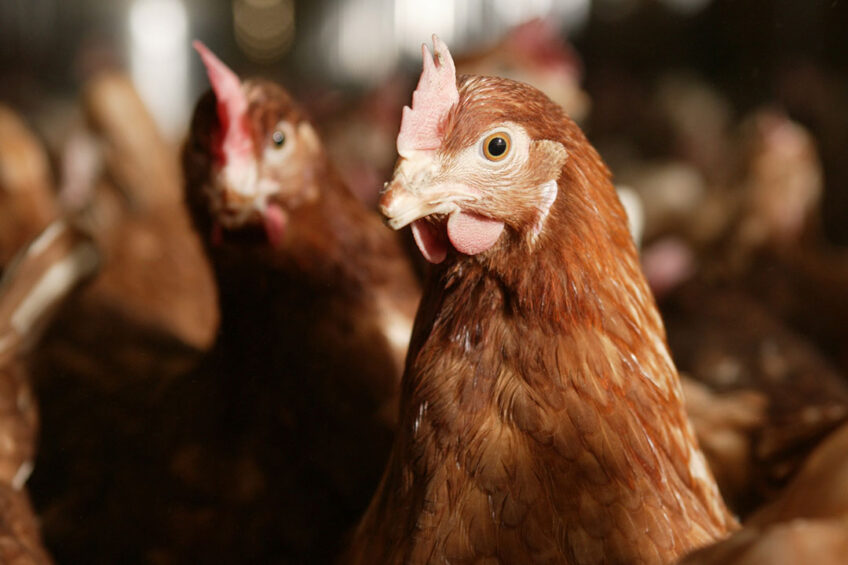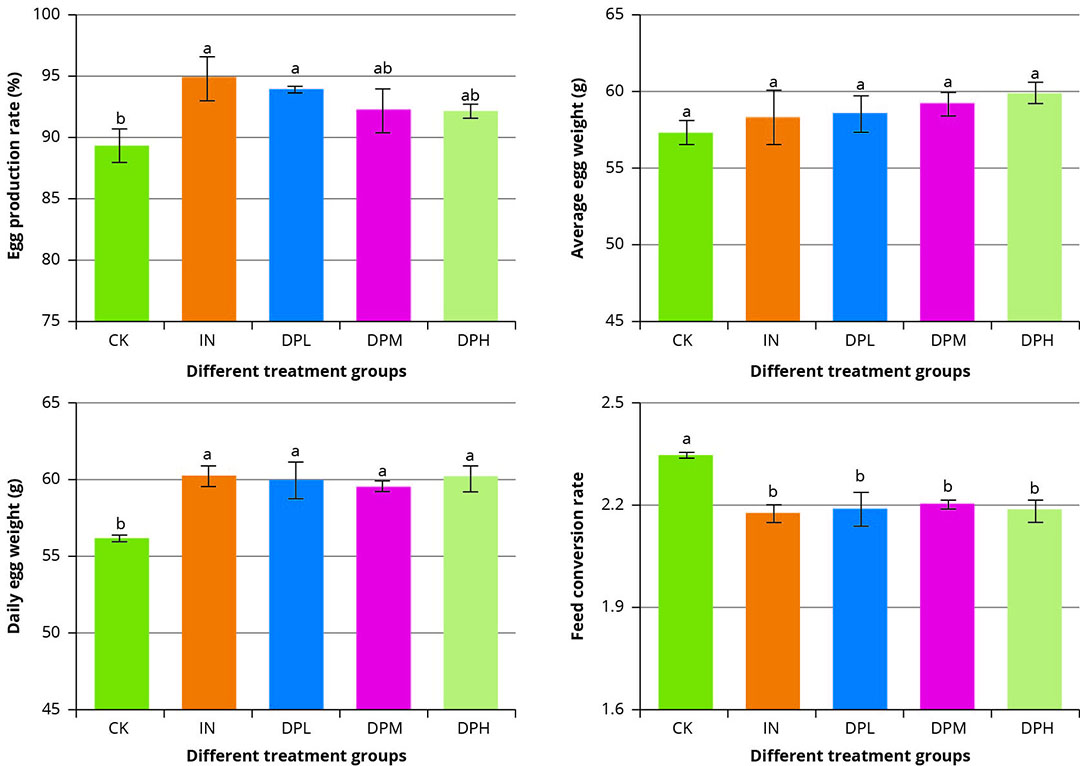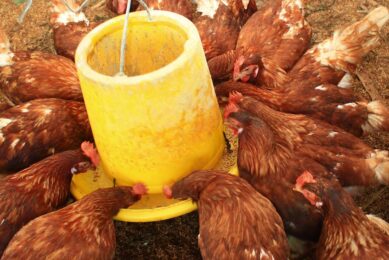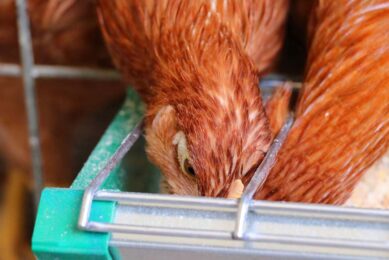The benefits of dandelion polysaccharides in the diets of laying hens

In a recent study, researchers found dandelion polysaccharide supplementation in the diets of laying hens improved production performance, which was associated with the regulation of the caecal microbiota.
The intestinal microbiota can regulate the metabolism and the immune system, playing a key role in poultry health and production. Imbalances in the gut microbiota of livestock and poultry often lead to metabolic disturbances, which in turn reduce production and even cause infections. The digestive enzymes in a host’s stomach and small intestine are unable to digest functional polysaccharides, so they enter the large intestine where they are fermented and utilised by the intestinal microbiota, thus regulating the intestinal microbiota. Short-chain fatty acids (SCFAs), which are produced by the fermentation of polysaccharides by intestinal microbiota, can promote the absorption of nutrients in the intestine, nourish intestinal epithelial cells, reduce the pH value, and inhibit the proliferation of pathogenic bacteria. Studies show that gut microbiota composition can be regulated using prebiotics in feed.
Dandelion, which belongs to the Compositae family, contains minerals, fibres, amino acids, vitamins and trace elements. It also contains a wide range of active ingredients, including terpenoids, polysaccharides, phytosterols, and polyphenols.
In broiler studies, supplementation with 500 mg/kg dandelion in the diet of broiler chickens was found to improve the feed conversion rate and the relative richness of Lactobacillus in the ileum.
Similarly, in laying hens, dietary supplementation with 1.5 % inulin was found to enhance the relative abundance of the Bacteroidales_S24-7_ group in the caecum while improving egg production and egg weight.
To lay a foundation for the use of dandelion polysaccharides in laying hen production, researchers working on the current study investigated the effects of dietary dandelion polysaccharides, compared to the prebiotic inulin, on the caecal microbiota composition, nutrient metabolic rate, egg quality, and performance of laying hens.
Dandelion and the laying hens
In this study, fresh dandelion plants in the flowering stage were used to extract polysaccharides. Researchers evaluated the influences of dietary dandelion polysaccharides (DP) on the performance and caecum microbiota of laying hens. The DP was mainly composed of rhamnose, mannose, glucose, galacturonic acid, arabinose and galactose. 300 laying hens were assigned to 5 treatment groups as follows:
- Control group (CK group): no additive
- Low DP group (DPL): basal diet supplemented with 0.5% DP
- Medium DP group (DPM): basal diet supplemented with 1.0 % DP
- High DP group (DPH): basal diet supplemented with 1.5% DP
- Inulin group (IN): basal diet supplemented with 1.5% inulin.
Improved egg production and quality
The results of the study showed that the nutrient metabolism rate, the egg production rate, and the daily egg weight increased, while the feed conversion rate was reduced by the supplementation of both the dandelion polysaccharides and inulin (Figure 1). In terms of the nutrient metabolism rate, the main nutrients analysed were crude fat, crude protein, ash, calcium, and gross energy. Nutrient metabolism was higher for all the nutrients in the DP and inulin groups compared to the unsupplemented (control) group, with the High DP group (1.5% DP) better than inulin on fat metabolism. When it comes to egg quality, in both the DP and inulin groups there were slight improvements in eggshell strength, Haugh units, and yolk index, indicating the higher freshness of the eggs supplemented with both dandelion polysaccharides and inulin.
Figure 1 – Production performance of laying hens (egg production rate, average egg weight, daily egg weight, and feed conversion rate) supplemented with dandelion polysaccharides and inulin.

The observed benefits of dandelion polysaccharides (DP) were related to the fermentation of the DP by intestinal microbiota and the effect of the fermentation products on the laying hens. Following this observation, the researchers analysed the caecum short-chain fatty acids (SCFAs) and microbiota composition in the hens.
Enhancing the microbiota balance
The results of the study showed that dietary DP supplementation enhances the relative richness of SCFA-producing bacteria (Alloprevotella, Parabacteroides, and Romboutsia) and reduces the relative richness of the inflammation-related bacterium Desulfovibrio in the caecum microbiota of laying hens. In addition, the supplementation of dandelion polysaccharides reduced the ratio of Firmicutes to Bacteroidota (F/B) compared to the unsupplemented diet. Studies show that a reduction in the F/ B ratio is associated with enhanced host energy metabolism, which is beneficial for the egg production performance of laying hens. On the other hand, inulin had a different effect but, like dandelion polysaccharides, improved the production of SCFAs. The inulin group increased the relative richness of Megasphaera, Megamonas, and Prevotellaceae_UCG-001, which are known to ferment polysaccharides and generate SCFAs.
The diets supplemented with inulin and dandelion polysaccharides led to significant differences in the modulation of microbiota compared to the control group, indicating that both additives have beneficial modulating effects on the composition of the laying hen caecum microbiota, according to the researchers.
Promoting SCFAs production
Due to the short digestive part of the gastrointestinal tract and the lack of enzymes to digest polysaccharides, polysaccharides easily reach the caecum of laying hens and are metabolised by the caecal microbiota. As the major metabolites of polysaccharides fermented by microbiota, SCFAs are involved in various metabolic processes in the host, including energy utilisation, anti-inflammation of the intestine, and intestinal motility.
In the current study, both DP and inulin groups reduced the caecum pH when compared with the unsupplemented (control) group. The dietary addition of DP enhanced the contents of total SCFAs, acetic acid, propionic acid, isovaleric acid, and valeric acid in the laying hen caecum contents. The inulin supplementation significantly increased the concentrations of the caecal isovaleric acid, total SCFAs, butyric acid, propionic acid, and acetic acid. “Therefore, the dietary supplementation of the inulin or DP increased the concentrations of caecal SCFAs and decreased pH, which suggests that both inulin and DP can be fermented and used by the microbiota in the caecum of laying hens,” the researchers concluded.
Potential feed additive for laying hens?
In this study, the supplementation of dandelion polysaccharides improved nutrient metabolism, feed utilisation and egg production, while maintaining the egg quality of laying hens. These beneficial effects might be related to the regulatory role of dandelion polysaccharides on the intestinal environment, which mainly manifested as increased SCFA concentrations, decreased pH, and increased relative abundances of Parabacteroides, Alloprevotella, and Romboutsia. The researchers concluded: “This research can provide a basis for the development of dandelion polysaccharides as a feed additive for laying hens.” The results also indicate that there is a difference in the action modes of inulin and dandelion polysaccharides in improving the production performance of the laying hens; however, both offer prebiotic benefits to laying hens.
Original article by Zihang Cao, Zhenhua Liu, Nanyi Zhang, Chenguang Bao, Xinyu Li, Mengxue Liu, Wei Yuan, Hongxin Wu, and Hongmei Shang. 2023. Effects of dietary dandelion (Taraxacum mongolicum Hand.-Mazz.) polysaccharides on the performance and gut microbiota of laying hens. International Journal of Biological Macromolecules 240:124422.
 Beheer
Beheer











 WP Admin
WP Admin  Bewerk bericht
Bewerk bericht